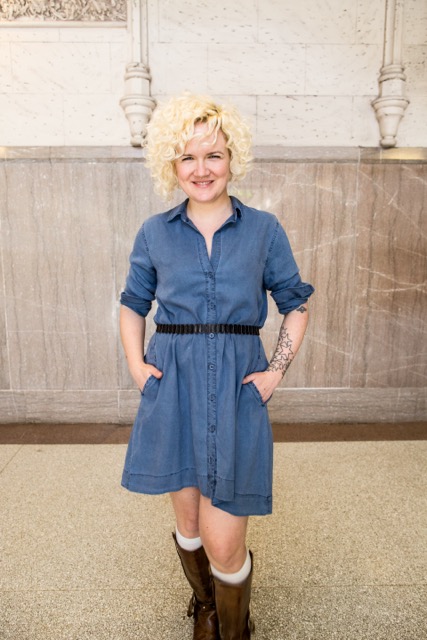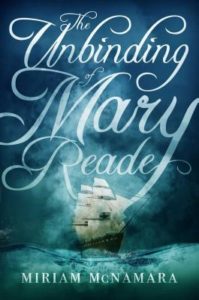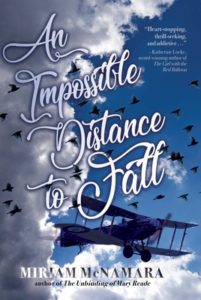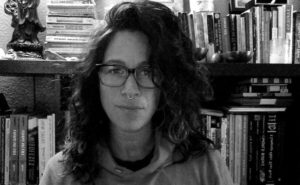
Miriam McNamara was born in Ireland, raised in the Southern United States, and now lives in the Midwest. She has an MFA in Writing from Vermont College of Fine Arts. She is the author of two queer young adult historical novels. Her debut, The Unbinding of Mary Reade, was released in 2018 by Sky Pony Press and won the Gold Medal for Young Adult Fiction from the Independent Publishers Book Awards. An Impossible Distance to Fall was released the following year and received the bronze in the same category. She is currently working on a young adult contemporary novel set in Minneapolis, Minnesota.
Find her here: www.miriammcnamara.com
Instagram: @booklovemimi
Miriam McNamara interviewed by Raki Kopernik: Queer women writers
Raki Kopernik: What inspires you to write, right now?
Miriam McNamara: I came out of a period of not writing very much about a year ago and I lost track of why I wanted to write. When quarantine happened, I suddenly had all this time. I was furloughed from my job and it gave me all this space I hadn’t had, just enough to rediscover why I love writing, that form of the creative process. I was like, oh yeah I really enjoy this way of mining my own experience, making stories of how I see the world. It helps me make sense of emotion, grief, relationships, joy.

RK: You’ve written two novels and are currently working on a third. How has your writing process changed or grown between novels?
MM: It’s feeling really different this time around. My first two are historical fiction, so I think part of what feels different–the novel I’m working on now is contemporary–and part of the reason it’s flowing so easily now is that I don’t have to research everything. But also, that first novel took me a long time to write. It was the novel where I learned how to write a novel. The second one was about practicing and proving to myself that I could do it. Because after you write one, you’re like, I don’t know if I could do that again. So with this third one I feel like I have a good foundation and I’m not trying to prove myself anymore. It’s come full circle, doing it now for fun like an art puzzle.
RK: Why did you choose to write a contemporary novel this time? Or was it even a conscious choice?
MM: I started with historical because my favorite stories are historical, fantasy, science fiction. The stories I really love tend to not be set in the here and now. I actually wrote a draft of a fantasy novel at first, and then felt unprepared to edit it. I also had previously felt like my life wasn’t interesting enough to write a contemporary story. People always say, you should write a story of your life. While this new one is fiction, it is based more on my own experience. When I started it, I’d just gone through a breakup and done a lot of therapy and suddenly I had a better understanding of my life. Suddenly my life felt more interesting, which is why I wanted to write something contemporary.
RK: Is it easier because you don’t have to do all the research?
MM: Yes definitely. When you’re flowing and you’re writing historical fiction, there’s a lot pulling you out of the scene over and over again. You’re like, did they have cigarettes? Or what are they wearing? So many details that you have to either consciously set them aside while you’re drafting, or you have to stop and look things up. When it’s the world you know, it feels a lot easier to snatch things from memories.
RK: How do you keep track of your characters and their worlds?
MM: Good question. Usually I start with the main character and it takes awhile to figure that person out. I’m at that place now in my new novel. I’m trying to make my cast, my supporting characters, cohesive. In the drafting process, they’ve appeared and disappeared, changed names and hobbies and backgrounds, depending on what works. So I’ll write a scene where the character’s a writer, and then they play ultimate Frisbee, just trying things out. Now I’m going back trying to make them cohesive and whole. They slowly materialize and then get to the point of feeling like real people. Then I don’t have to keep track. But I’m pretty disorganized. Sometimes I’m like, who’s this person? I know some writers have binders with pages, but that’s not how I work. I just go back and check when I need to.

RK: Both of your previous novels are centered around queer identified people. As a queer woman, is it important that all of your books embody queerness in some form?
MM: Yes! One of the reasons I’m passionate about what I write, what gives me a sense of purpose with my writing, is that I’m writing from this marginalized identity that has been incredibly underrepresented in the past. When I read books growing up, I never saw any stories about people like me. When I experienced my first queer attraction, I thought I was inventing something. It was incredibly lonely. I want to give teens, like the kid I was, a sense of belonging, and I want to give teens who have never considered perspectives outside of their own a window that experience.
RK: I had the same experience growing up. It’s important to normalize queerness and to make it more accessible. Does it feel more challenging to get your work agented and published because it’s LGBTQ centered? Do you think the literary world is becoming more open to this kind of work?
MM: I do think that before the We Need Diverse Books movement in the YA lit community, it was way harder to get a queer book through the gatekeepers. Since I started querying agents eight years ago, I’ve seen so much growth in the industry’s openness to LGBTQ+ stories. But there is still a ways to go for sure.
RK: Which is why we, as queer writers, have to keep writing and publishing our work. Can you say more about We Need Diverse Books?
MM: We Need Diverse Books was founded in 2014. It’s a 501(c)(3) non-profit and a grassroots organization of children’s book lovers that advocates essential changes in the publishing industry. Their mission is to help produce and promote literature that reflects and honors the lives of young people. They do all sorts of cool stuff like book awards, grants for diverse authors, programs to get diverse authors into schools, and mentorships and internships aimed at promoting diversity within the industry. They focus specifically on kids lit at every level, from authors to editors to booksellers. I think it really changed the conversation in a profound way.
RK: As a writer, I find it so important to reflect my own identity in my work. But also, I grapple with the balance between mirroring what’s happening in the world and finding a sense of escape for relief, fun, and pleasure. You mentioned you like to read stories that are not set in the here and now. Sometimes, often even, genres like science fiction tend toward social commentary and do reflect the world we live in. How do you handle this balance? Do you write for escape or for connection or both?
MM: I love that juxtaposition of escape and connection. I think I write to escape in the same way that I read to escape—I don’t think there’s anything wrong with wanting to tune out the world for a bit. Sometimes it’s healthy. When so much is outside of our control, our creative work is the one thing that we have absolute control over, and that can be great to have that sense of authorship. But I also think escape can become meaningless or even harmful if you’re not also using it as a way to connect. I have a sense of purpose, of writing for kids or even adults that feel lonely or misunderstood or disconnected, and that makes it meaningful. I think in terms of on the page, in my historical fiction for example—I wrote about the aftermath of the stock market crash of 1929, but it felt meaningful and connected to the present because we were in the Great Recession, and I was having this sense of my expectations of my future not matching up to reality. I wrote about these barnstorming circuses as a way to explore women who found community and family outside of traditional roles, because that’s what I’ve done. It was absolutely connected to the present and commenting on the present—but it was more fun to me to use this historical lens to hold up to my ideas and filter them through it.
RK: What’s your favorite place to write?
MM: This year has been weird. I’ve done most of my writing at home or at residencies, which is my favorite. Writing vacation! It’s nice to go on residency because you can get so deep into it. You don’t have to spend that time scratching back down to where you were. Now I’m trying to set aside a few days at a time when I really focus. Residency is the best. In my house I go between the bed and the couch and the kitchen table.
RK: If we weren’t in quarantine what would your favorite place be?
MM: Coffee shops. Coffee shops feel like a special time, like a date with your characters drinking fancy drinks.
RK: What makes a great story?
MM: A balance between really good literary writing, in terms of senses and themes, and a well plotted novel. I like a good pace. A strong balance and that yearning or desire, romance, characters that long for things, a visceral experience.
RK: What is the best advice you’ve ever been given about writing and/or publishing. Or what advice would you give to new writers?
MM: A lot of little things. Having gone through the agent and publishing process, I think you really have to love your story and write it for you and the people you think would love it, not for publishing. Love. Your. Story. And keep writing. I know a lot of people who want to write a novel or who wrote a draft and then got discouraged. It’s a long game. Which comes back to loving it.
RK: If you could have dinner with any writer, living or dead, who and why? What would you eat?
MM: Hafiz the poet comes to mind immediately. I love his expression of spirituality, what is joy and love. His idea of religion has resonated the most with me. I feel like I would love him. We’d obviously have to drink wine because he was always drunk on god and alcohol. I think we’d eat some weird modern food. I’d be like, check this shit out that you never had when you were alive, like pizza. Bring him some food joy.

RAKI KOPERNIK is a queer, Jewish fiction and poetry writer. She is the author of The Things You Left (Unsolicited Press 2020), The Memory House (The Muriel Press 2019) a 2020 Minnesota Book Award finalist, and The Other Body (Dancing Girl Press 2017). Her work has appeared in numerous publications and has been nominated for several other awards, including the Pushcart Prize for fiction. She lives in Minneapolis. You can find her at https://rakikopernik.wixsite.com/mysite and follow on Instagram @rakikopernik.
